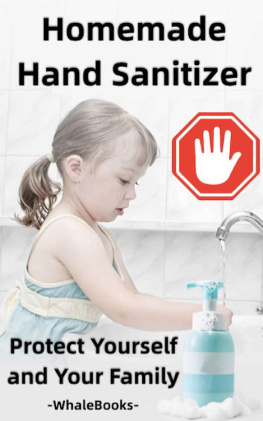POWERFUL HOMEMADE HAND SANITIZER RECIPE WITH ALCOHOL AND NATURAL GEL
SARAH DANIELLE
Copyright March 2020 by Sarah Danielle
All Rights Reserved. Contents of this book may not be reproduced without written consent of the publisher, with exception of brief excerpts in critical reviews and articles.
All texts, calls, letters, testimonies and enquiries are welcome
Disclaimer
Dear user, please note that every content in this book is well researched, written and published for informational purposes only. Thus, this book is not intended to prevent, diagnose, treat, or cure any disease or condition.
Please endeavor to consult a healthcare specialist or your physician regarding all recommendations and suggestions made in this book, which you are not comfortable with, as you understand that this book is not meant to serve as a substitute for consultation with your physician or any other licensed practitioner.
Using this book implies your acceptance of the above disclaimer.
CONTENTS
Introduction
Hand Sanitizers
Myths And History Of Hand Sanitizers.
History Of Hand Sanitizers:
How Effective Are Hand Sanitizers?
Possible Health Challenges Of Using Hand Sanitizers And How To Handle Them
Importance Of Hand Sanitizers
How Hand Sanitizers Can Kill Viruses.
How To Use Hand Sanitizers
Guides To Making Effective Homemade Hand Sanitizer
Safety
Risks Involved In Making Hand Sanitizers
Things To Avoid
General Safe Storage And Handling
Introduction
Never before in the history of earth has there been a time where people all over the world have to be highly aware of their surroundings and very careful. The recent pandemic has caused a lot of ripple effects across almost all countries and continents. This has planted unusual fear across the hearts of men; the fear of the unknown. But thanks to our Government, doctors, and all the citizens of our great nation, including you, for the effort so far to stop the pandemic.
Never before has there been the need for man to be more informed and take informed decisions on a daily basis. Experts say self-isolation and practicing very high hygienic habits are the keys to remaining unharmed by the pandemic.
Above and beyond staying indoors, one must be equipped with the knowledge and skills to survive the season and beyond. It has been proven that the virus is transmitted via contact so we are advised to reduce how we touch our faces, amongst many things.
Even if man is to limit how many times he touches his own face, it is almost impossible to eliminate human contact entirely. So the best practices remain to be armed with the right knowledge and the right skills to stay healthy.
One of the right skills and knowledge to have at the moment is to know how to stay free of any virus by making, using, gifting, and even selling hand sanitizers to make some extra income. This is one major survival skill needed for such a time as this.
That is why you have this guide in your hands now. In this guide we will take a deep dive into the broad topic; how to make homemade hand sanitizers.
In the following lines, these are the subtopics we will be covering.
About hand sanitizers
- What is hand sanitizer?
- Myths and history of hand sanitizer
- How effective are hand sanitizers?
- Possible health challenges of using hand sanitizers and how to handle them.
(2) Importance of hand sanitizers
(3) How hand sanitizer can kill virus
(4) How to use hand sanitizers
(5) Different guides to making homemade sanitizers
(6) Safety
- Risks involved in making hand sanitizers
- Things to avoid
- General safe storage and handling
Let's dive right in.
Hand Sanitizers
What is a hand sanitizer?
A hand sanitizer is an agent which is generally used to decrease or eliminate infectious agents and dirt on the hands. Hand sanitizers are usually liquid or gelatinous and are widely preferred, as opposed to the regular use of soap and water for hand cleansing.
More widely used are alcohol-based hand sanitizers which are preferred because of their antibacterial and microbial properties.
Alcohol-based hand sanitizers usually are made up of some combination of isopropyl alcohol, ethanol (ethyl alcohol), or n-propanol. The most effective of hand sanitizers are those that contain about 60-95% of alcohol. In the usage of these kinds of sanitizers, careful precaution should be taken to ensure the person is not exposed to fire or flames, because they are highly flammable.
Some of the alcohol-based hand sanitizers contain compounds such as glycerol, which helps to prevent drying of the skin.
Non-alcohol based sanitizers on the other hand, may contain benzalkonium chloride or triclosan.
Hand sanitizers usually come in fist-sized sealed bottles. It is advised that at the point of purchase, if it is discovered that the seal of the bottle is broken, the person should not proceed with the purchase of the sanitizer.
Myths And History Of Hand Sanitizers.
Myths Of Hand Sanitizers :
Since hand sanitizers were adopted as a regular part of the antiseptic agents used daily for reducing the effects of dirt on the hands, quite a lot of myths have been coming up about them. Many people believe they are overrated, while others think hand sanitizers are not effective at all.
Over the course of studies carried out through the years, some of these myths have been identified and corrected through scientific research and better orientation.
Some of these myths include, but are not limited to.
1. Hand sanitizers cause antibiotic resistance.
One of the most common myths about hand sanitizers is that over time, they cause antibiotic resistance.
This is however not entirely true. The truth is that as opposed to hand sanitizers which are used on the skin, antibiotics are ingested. When ingested, antibiotics work completely differently unlike the alcohol-based hand sanitizers.
Alcohol-based sanitizers act quickly, killing a broad spectrum of germs, and are not left behind on the skin to let the germs become resistant to the alcohol.
According to the Centers for Disease Control and Prevention, the primary cause of antibiotic resistance is when antibiotic use is repeated and misused.
(2) Alcohol based hand sanitizers can cause super germs .
One myth currently being peddled about alcohol-based hand sanitizers is they can create super germs.
The truth is that ethyl alcohol, which is the active ingredient in many hand sanitizers, quickly acts on the cell membranes of germs, destroying them and denaturing the proteins. Afterwards, this ethyl alcohol is not left behind to allow those germs become resistant or become what some persons would prefer to call super germs.
(3) All germs are the same, hence using alcohol-based sanitizers is a waste.
Research and extensive studies over time has shown that all germs ARE NOT the same. With respect to this context of our discussion, there are basically 2 different types of germs resident organisms and transient organisms.
The resident organisms were meant to live on our skin; at all layers of the skin. The transient organisms are contacted as the individual interacts with his surroundings and touches something. Because of this, they can be carried inside the person's body, or to someone else directly or via other objects touched (i.e. cross-contamination), putting you and others at risk for illness.




